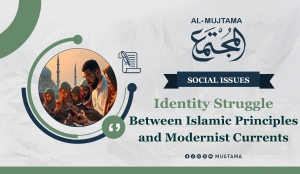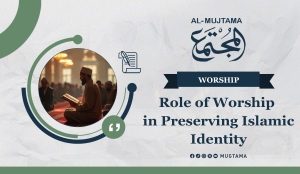Identity Struggle Between Islamic Principles and Modernist Currents
February 21, 2025Amid the shifting values in Muslim societies, a young man stands at the threshold of adulthood. He was born and raised in a home that revered Islamic principles, knowing that manhood is a responsibility and that guardianship is a duty, not a privilege. Yet today, he lives in an era where these concepts have become mere passing debates. He hears claims that absolute equality between men and women is the only path to justice and that guardianship is nothing more than a remnant of an outdated patriarchal culture. As he looks around, he sees young men like him who no longer view themselves as leaders but have instead become spectators in a society that changes without them, torn between holding on to their roots or drifting with the tide.
In another scene, in a home that was once filled with warm family values, a mother sits, exhausted by life's pressures. She juggles a job she never saw as necessary and the increasingly difficult task of raising children in the shadow of overwhelming screens and external influences. She knew that motherhood was a noble role and that the family was the fortress of society. But now, she finds herself confronted with voices telling her that sacrificing for the family is weakness and that true success lies in complete independence from traditional responsibilities. As she looks at her children, she wonders: Do they need a mother, or a new model that aligns with the demands of the age?
Elsewhere, in a media landscape that once nurtured awareness and protected identity, the scene has changed. Programs now promote moral laxity under the guise of liberation, sitcoms mock traditional values in the name of comedy, and advertisements impose new standards of beauty and social status. Where Muslim societies once shielded themselves from such ideological invasions, today they consume them unresistingly, even welcoming them into their homes without recognizing the consequences.
Were these changes natural? Or is there something deeper at play?
In an even broader scene, in the arenas of intellectual discourse, voices clash. Some argue that value transformations are an inevitable requirement of modernity, while others warn against losing identity under the pressures of Westernization. Amidst them, there are silent observers who witness the scene with sorrow. They understand that change may be necessary but also recognize the distinction between progress and self-erasure. They clearly see the difference between embracing the natural course of life and abandoning the very foundations upon which Muslim societies are built.
And here, the great question arises: Can matters be restored to their rightful balance? Can a harmony be achieved between modernity and identity? Are there still voices in the Ummah willing to declare: We are a nation with our own values, principles, and distinctiveness that must not dissolve into Western currents? The words of Allah resonate: "Then is it the judgment of ignorance they desire? But who is better than Allah in judgment for a people who are certain [in faith]." (Al-Ma'idah: 50)
The answer begins when each individual in this society decides to redefine their identity—not as others dictate, but as their faith, history, and natural disposition dictate. Islam is preserved by Allah’s promise, and human nature cannot be erased no matter how strong the tides of Westernization grow. This Ummah has endured many trials, yet it always emerges stronger because there are always those who hold fast to the truth. The Prophet ﷺ said: "A group of my Ummah will continue to prevail upon the truth. Those who abandon them or oppose them shall not harm them until Allah’s decree arrives while they remain as such." (Sahih Muslim)
Moreover, balancing modernity and identity does not mean melting into the West but rather building a comprehensive civilizational model rooted in Islamic values rather than dry materialism. The Muslim must harness ideas to create a revival firmly anchored in our principles, just as the early Muslims did when they combined knowledge with faith and progress with identity. Allah says: "You are the best nation produced [as an example] for mankind. You enjoin what is right and forbid what is wrong and believe in Allah." (Aal 'Imran: 110)
The voices of those who believe in the truth have never and will never disappear, no matter how much the media tries to suppress them. Awareness is growing, and revival is renewing itself. We have seen Muslim communities in the West resisting dilution campaigns and families rediscovering Islam’s role in building society. All of this is proof that Islam is stronger than any attempt to dissolve it and that human nature will always seek and return to the truth, no matter how far it strays.
-------------------------------------------------------------
Role of Worship in Preserving Islamic Identity
January 07, 2025
Identity in linguistic dictionaries is defined as the essence of something that distinguishes it from others, encompassing the characteristics and features that preserve the uniqueness of an entity. When we talk about Islamic identity, we refer to the truths and attributes that make the Muslim Ummah distinct, qualities that no other nation can share. Islamic identity is manifested in the unique Islamic framework for individuals, societies, and the Ummah as a whole. Below is an explanation of the impact of major Islamic acts of worship in preserving Islamic identity.
The Role of Prayer in Preserving Islamic Identity
Prayer begins with the Adhan (call to prayer), a method of announcing its time. When the Prophet ﷺ and his companions migrated from Mecca to Medina, they considered a way to determine the timing of congregational prayers, as some struggled to estimate the time correctly. Some would arrive at the mosque too early, sacrificing their personal affairs, while others would miss the virtue of praying with the Prophet ﷺ. This posed a challenge, leading the Prophet ﷺ and his companions to discuss solutions.
The companions suggested various options based on their time’s available methods: some proposed blowing a horn like the Jews, others suggested using a bell like the Christians, while others recommended lighting a fire or raising a flag. None of these suggestions resonated with the Prophet ﷺ.
That night, Allah showed Abdullah ibn Zaid a vision where a man taught him the words of the Adhan. Abdullah hurried to the Prophet ﷺ to share his vision, and the Prophet ﷺ said, “It is a true vision.” He then instructed Abdullah to teach the words of the Adhan to Bilal ibn Rabah, who had a more resonant voice. (Sunan Abi Dawood: 498)
Prayer preserves Islamic identity through the gathering of Muslims in mosques to perform it. Islam strongly encourages men to pray in congregation at the mosque regularly and advises men not to prevent women from attending the mosques. On Eid prayers, even young women, menstruating women, and un-married women are encouraged to join in addition to others. Demonstrating this ritual safeguards Islamic identity within society and strengthens its persistence and progress.
The Role of Zakat in Preserving Islamic Identity
The Prophet ﷺ emphasized that poverty is closely linked to disbelief. In the Musnad of Ahmad, Abu Bakrah reported from his father that the Prophet ﷺ said: “O Allah, I seek refuge in You from infidelity and poverty.”
The Prophet ﷺ paired the two because poverty can lead to disbelief. Islam prescribes zakat to aid the poor, preventing poverty from dragging them toward disbelief. Zakat, therefore, plays a role in preserving the identity of the community by ensuring that the needy are not preoccupied with their hunger or pursuit of basic needs, enabling them to stay steadfast on the path of Allah.
The Role of Fasting in Preserving Islamic Identity
Fasting emphasizes Islamic identity through differentiation from others. Fasting was prescribed for previous nations as well, but Islam brought a distinctive touch. A hadith in Sahih al-Bukhari states that Ibn Abbas narrated: The Prophet (ﷺ) came to Medina and saw the Jews fasting on the day of Ashura. He asked them about that. They replied, “This is a good day, the day on which Allah rescued Bani Israel from their enemy. So, Moses fasted this day.” The Prophet (ﷺ) said, “We have more claim over Moses than you.” So, the Prophet fasted on that day and ordered (the Muslims) to fast (on that day).
In Sunan Abi Dawood, Abdullah ibn Abbas reported: When the Prophet (ﷺ) on the day of 'Ashurah and commanded us to fast on it, they (i.e. Companions) said: Messenger of Allah, this is a day which is considered great by Jews and Christians ? The Messenger of Allah (ﷺ) said: When the next year comes, we shall fast on the 9th of Muharram. This differentiation from non-Muslims serves to distinguish Muslims and maintain their identity.
The Role of Hajj in Preserving Islamic Identity
Hajj reinforces and protects Islamic identity. The Prophet ﷺ took measures to eliminate pre-Islamic identities, particularly Arab pagan practices and customs, and firmly established Islamic identity. For instance, some Arabs would circulate the Kaaba naked, reasoning that they should not perform tawaf (circulating Kaaba) in clothes they sinned in. They would then resume wearing clothes after tawaf. The Quraysh later produced special unstitched garments for pilgrims, but those who could not afford them performed tawaf unclothed. This practice persisted until the conquest of Mecca, when the Prophet ﷺ prohibited it, stating: “No naked person should go round the House (the Ka'bah).” (Sahih al-Bukhari)
Another example of the Prophet ﷺ affirming Islamic identity was his abolishment of a privilege claimed by some Meccans. They called themselves “the Hums” and they would stand in the middle of Urana. Allah commanded all pilgrims to stand together at Arafat: “Then depart from the place from where [all] the people depart and ask forgiveness of Allah. Indeed, Allah is Forgiving and Merciful.” (Al-Baqarah: 199) Malik in Al-Muwatta narrates that Abdullah ibn Zubair reported the Prophet ﷺ saying: “Know that the whole of Arafa is a standing-place except for the middle of Urana.”
These examples of Islamic acts of worship emphasize the establishment of Islamic identity in individuals and society. The prevalence of worship in all aspects of life strengthens this identity, enabling it to permeate society, as Allah says, “[And say, ‘Ours is] the religion of Allah. And who is better than Allah in [ordaining] religion? And we are worshippers of Him.’” (Al-Baqarah: 138)
-------------------------------------------------------------



